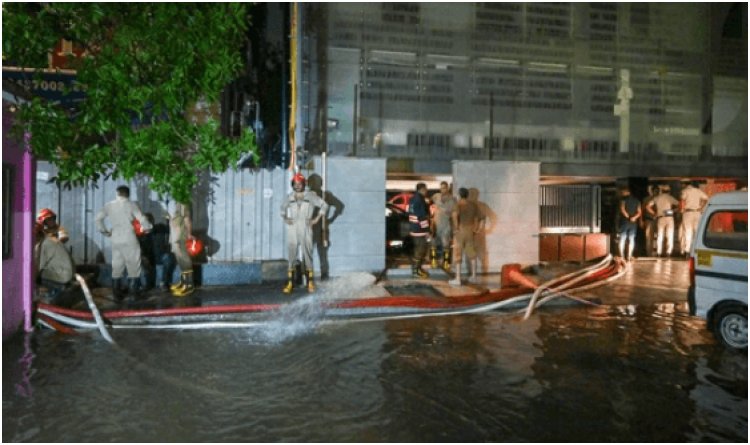Delhi Rau's IAS Study Circle Devastated by Catastrophic Flooding: 3 civil service aspirants killed in coaching flooding
Delhi Rau's IAS Study Circle Devastated by Catastrophic Flooding: 3 civil service aspirants killed in coaching flooding

Delhi was rocked by a devastating incident when severe flooding at a coaching center for civil service aspirants resulted in the tragic deaths of three students.
The coaching center, renowned for its rigorous preparation programs, found itself overwhelmed as heavy monsoon rains turned its premises into a disaster zone. The students, who had been diligently preparing for one of the country’s most competitive exams, were caught in the floodwaters, which caused significant chaos and destruction.
The intensity of the flooding was so extreme that it led to the submersion of critical areas within the center. Classrooms, libraries, and administrative offices were inundated, causing considerable damage to the infrastructure and essential study materials. In the chaos that ensued, several students were trapped, and despite rescue efforts, three lives were lost. This tragedy has left the families of the deceased in mourning and has raised serious concerns about the safety protocols and emergency preparedness of educational institutions.
The incident has sparked a heated political debate, with the Bharatiya Janata Party (BJP) accusing the Aam Aadmi Party (AAP) government of negligence. The BJP has criticized the AAP administration for failing to address the chronic issues of urban flooding and inadequate drainage systems in the capital city. According to BJP leaders, the government’s lack of effective flood management has directly contributed to the severity of the situation at the coaching center.
The AAP, on the other hand, Delhi has countered the accusations by highlighting the unforeseen nature of the extreme weather conditions that led to the flooding. They have emphasized that the unprecedented rainfall was beyond the scope of normal drainage systems and that the government is committed to improving infrastructure and response mechanisms. The party has promised a thorough investigation into the incident to determine the exact causes and to ensure that such a tragedy does not recur.
In the wake of the Delhi flooding, the coaching center’s management has been criticized for not having adequate emergency response plans in place. There were reports that the students had limited access to safe evacuation routes, which contributed to the tragic loss of life. The management has vowed to review and overhaul their safety protocols to better prepare for future emergencies. They are also working on providing support to the affected families and assisting in the recovery process.
The tragedy has highlighted Delhi broader issues related to urban infrastructure in Delhi. The city has been grappling with poor drainage and inadequate flood management systems for years. Experts argue that the frequent flooding during the monsoon season is a result of systemic failures in urban planning and maintenance. The incident has brought renewed focus on the need for substantial investments in infrastructure to address these long-standing issues.
Local residents and civil society groups have expressed their outrage over the incident and have called for immediate action to prevent similar tragedies. There have been public demonstrations demanding better flood management and improved safety measures for educational institutions. The community is seeking accountability from both the government and the coaching center’s management to ensure that necessary changes are implemented.
In response to the incident, the Delhi government has announced a series of measures aimed at improving flood resilience. These include the installation of additional drainage systems, the implementation of more effective flood monitoring, and the development of emergency response plans for critical infrastructure. The government has also pledged to support the families of the deceased and to assist with the recovery efforts of the affected coaching center.
The deaths of the three civil service aspirants have cast a somber shadow over the city. Their families, grappling with the loss, have called for justice and accountability. The tragedy has underscored the critical need for systemic improvements in both urban infrastructure and emergency preparedness. It has also highlighted the importance of ensuring that educational institutions are equipped to handle emergencies and protect their students.
As Delhi grapples with the aftermath of the flooding, there is a growing sense of urgency to address the underlying issues that led to this tragedy. The incident has served as a wake-up call for both the government and the public, emphasizing the need for concerted efforts to improve urban resilience and safety. The hope is that the lessons learned from this disaster will lead to meaningful changes and prevent future occurrences of such devastating events.
In conclusion, the flooding at the coaching center and the subsequent loss of three young lives have exposed critical vulnerabilities in Delhi’s infrastructure and emergency response systems. The Delhi political blame game between the BJP and AAP, while significant, does not overshadow the urgent need for comprehensive solutions to address these challenges. As the city mourns the loss of the aspirants and seeks justice, there is a pressing demand for action to ensure that such a tragedy is not repeated and that all residents, especially students, are safeguarded against the impacts of extreme weather events.

 shivani
shivani 



